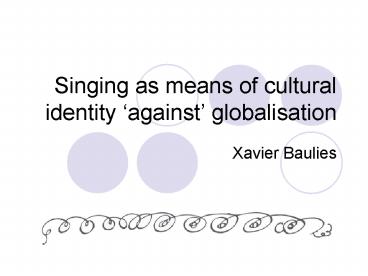Singing as means of cultural identity against globalisation PowerPoint PPT Presentation
1 / 14
Title: Singing as means of cultural identity against globalisation
1
Singing as means of cultural identity against
globalisation
- Xavier Baulies
2
Introduction
- Diversity of musical history linked to the
geographical and sociological realities is the
basis form which choral music at local level
keeps the identity of ways of thinking, feeling
and singing. - Beyond this, there is a determinant role of the
voice itself and language to harmonically color
music and preserve cultural identity. - In this respect the analysis of transparency of
vowels, use of consonants and proper vocal
technique, oriented to strong and artistic
communication, can provide a better understanding
on the capacity of a given choral music to
sustain local culture against globalization.
3
Index
- diversity of musical history
- geographical and sociological realities
- natural intonation and temperaments
- voice, language and communication
- transparency of vowels, use of consonants and
proper vocal technique - a capella artistic communication
- thinking, feeling and singing
4
1. Diversity of musical history
- History (from Local and Region to Global)
- India, Europe, America
- Asia
- Africa, Australia
- Instruments (perception of Harmony)
- Voice, Drums, Strings, Other Metal and Brass
- Temperament evolution
- Natural Intonation and Equal Temperament
(Tonality Modulation)
5
1. Diversity of musical history
- History (from Local and Region to Global)
- India -gt Europe -gt America
- India lt-gt Asia
- Africa
- Australia
6
1. Diversity of musical history
- Materials (2 interrelated ways of vibration)
- projection of voice and resonance (from human
musical imagination to instrument construction) - perception of Pitch, Harmony and Rhythm (from
universe to human musical perception) - Instruments
- Voice,
- Drums,
- Strings,
- Other Metal and
- Brass
7
1. Diversity of musical history
- Temperament evolution
- from Natural intonation to Equal Temperament
(Tonality Modulation and equal use of tones) - Misunderstanding of the concept
- BACH Well-tempered clavier as an Equal
Temperament rather than an asymmetric one - Reference Bradley Lehman
- Singing effect in Europe and North America Long
major thirds and short fifths
8
B C
E
A
D
G
B is not equal to C There is a COMMA
9
BACHs diagram
Bach's diagram shows a tuning sequence. Starting
at F-C, C-G etc, go clockwise around the circle.
Temper the 5ths narrow by 1/6 (2/12) comma, 1/6,
1/6, 1/6, 1/6, 0, 0, 0, 1/12, 1/12, 1/12.
10
2. Voice, language and communication
- Key point for choral resilience at local level
- Every language have transparency of vowels,
specific use of consonants and proper vocal
technique, historically associated to emotion and
feeling - Every culture need to develop musical language
and to promote quality composers to build up
complexity
11
2. Voice, language and communication
- The voice can be seen as a balance between
projection and resonance - two inseparable axes of energy
- Where is clarity? (pitch and language)
- Where is darkness? (harmony and timber)
12
2. Voice, language and communication
- a capella artistic communication
- Dynamic intonation of choral performance
- orchestral adaptation to emotion
- Ways of thinking, feeling and singing
- Use of technical support
- Piano (not as basis for harmonic intonation)
- Alexander Technique
- Psychophysical coordination
- Inner Game of Music
- Awareness, Will and Trust
- Language pronunciation
13
Catalonias choral vitality
- 120 federated children choirs
- 450 federated adult choirs
- Internet access to Catalan repertoire and
coordinated activity - Interest for training courses for conductors and
singers - Increasing number of auditoriums and concerts
- Positive 2003 Europa Cantat effect?
14
Examples
- Cantarina Choir (Czech Women's Choir)
- Baba yetu (African song)
- Siyahamba
- Uz Mne Kone Vyvadeji (Czech folk song)
- The Boys Choir of Kenya
- Auma Chapia
- Jowi KitiKiti
- Papale Pitie
- Eric Whitacre
- Waternight

